Senatus Civitas Zetanus
Under Construction
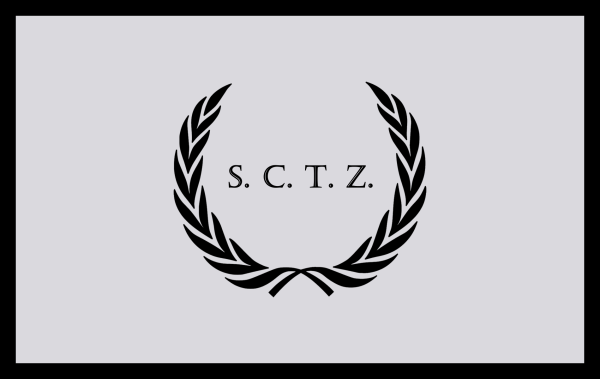 Civil Ensign
Civil Ensign
Motto: Non suspectum sed semper Vigilantes
Capital: Zeta
Current Princeps Civitatis: Lucius Aurelius Cotta
Current Magister Equitum: Gaius Atilius Barbo
Current Magister Auxilia: Marcus Fulvius Flaccus
Current Sacerdotes Maximus: Publius Cornelius Poplicola
Etymology
History
Foundation Myth
Early Years
Government
The Republic is an Elective Principate, where the Princeps Civitatis is elected by the Senate for life. His partner is the Magister Equitum, or Master of the Horse, is his chief lieutenant, elected for life with the same powers. In the event the Princeps Civitatis dies, the Magister Equitum takes his position until another is elected.
Structure
The government is set up in a semi-decentralized nature.
At the the "Princeps Civitatis" or the First Citizen of the Republic. The Princeps Civitatis serves the role of chief elected executive of the state, and through him all decisions made by the senate are reviewed. He is the commander in chief of the military, has extraordinary and extrajudicial powers that he is expected to use only when needed and takes the paternalistic role as the father of the people, supposed to represent all virtues and be the face of the nation to the People. He sits in the senior chair at senatorial meetings.
Second to him is the "Magister Equitum", or Master of the Horse. He is the junior chief elected executive and often takes the de-facto role of the Princeps Civitatis in places where the Princeps Civitatis is not, given that he shares the same extraordinary powers and extra judicial powers, and in second command of the military. Unlike the Princeps Civitatis, the Master of the Horse is not supposed to be this ideal ruler but is expected to be the cruel hand to the Princeps Civitatis' hand of clemency. He does the dirty work and often travels to the provinces to perform the roles of the Princeps Civitatis there. When he is in the Senate, he takes the junior chair, and he is the senior in the meetings of the People's Assembly.
The Senate itself technically has the most power in all of this, given that they can formally depose either of the two former if evidence is provided in court that they have abused their power or if the "Senatus consultum ultimum" is passed, something that cannot be vetoed by either of the two formers. The Senate is the legislative and judicial body of the state, where laws are proposed and passed to be reviewed by the Princeps Civitatis. They also appoint magistrates (High ranking Judges). Their power comes from the laws governing their assignment to the senate and they are senators for life unless convicted of crime. The ethical requirements of becoming a senator are rather high, as they must not participate in banking, foreign trade, nor have committed a felony. Furthermore, the National Tribunal is held to review the character values, and property value of the candidate to see if they are worthy of office. Membership of the Senate is non-hereditary but is limited to the Patrician class or those elevated to Patrician status. The Senate is a total of 250 men and all members of the Senate cannot leave Vestia unless appointed to the provinces.
The People's Assembly is a less partner to the Senate, but still shares many powers. It can pass laws, appoint magistrates and appoint Plebian Tribunes, which represent the voice of the Plebs in the Senate. 500 men make up the Assembly but are not limited by the same restrictions as the Senate. Membership of this Assembly is voted on by the people themselves.
Each Province is ruled by a Magister Provinciae, elected from the Senate, who serves a similar role to the Princeps Civitatis on a local level. He is the Chief Military and Executive leader of the province and is the head of the Provincial Assembly for his province. Praetorship is expected on the resume of future Princeps Civitatis' but not Magister Equitum. Likewise, he also has his own Chief Lieutenant known as the Praetor, who is elected from the Provincial Assembly. Successful Praetor's are often considered for Magister Equitum and/or membership for the national senate should they meet the qualifications.
The Provincial Assembly is the provincial form of the Senate/People's Assembly and has the same powers on a provincial level for the most part. They elect Praetors and can depose them if proof of abuse is shown. Furthermore, they deal with local laws and problems, which are superseded by direct Senatorial laws. The Provincial Assembly does not have the class restrictions of the Senate, as all Plebians can join it, but also holds other standards such as the ethical requirements and must undergo review by the Provincial Tribunal before being accepted. The Provincial Assembly is a total of 150 members, but they are free to leave the province at any time.
The National Tribunal is made up of twelve Censors, which are older senators of particular moral virtues and are highly respected by their peers. Censor is an appointment for life and beyond the reviewing of membership for the senate, they also are expected to maintain and conduct the census, supervising public morality, and overseeing certain aspects of the government's finances. Their decisions may not be vetoed even by the Princeps Civitatis. The Provincial Tribunals are made up of six Provincialis Censor, who serve basically the same role on regional levels. Their decisions may be vetoed by the National Tribunal.
Magistrates are Judges elected on a national level that serve as the judicial role across the nation. They are elected for life, and while not always experts in law, often are. Regardless, they are advised by experts in law in their dealings and are expected to be impartial. Should partiality be found by the Censors on either the national or provincial level, they can be removed.
The Religious hierarchy is not tied into the government structure, rather being separate. At the top is the Pontifex Maximus, the head of religion in the state. He is elected by the 6 members of the College of Pontiffs, men from any class that have shown themselves to be well versed in theology and well-respected moral citizens. They are elected by the people and their role includes advising the Senate on issues pertaining to the gods, the supervision of the calendar and thus the supervision of ceremonies with their specific rituals, and the appeasement of the gods upon the appearance of prodigies. They are but one of two colleges.
The other College is that of the Vestia Virgins. These women are held to be sacred to the sanctity and security of the nation and are in charge of reading omens and being the caretaker of the fire of Vestia. Their terms are 25 years and are expected to remain virgins during this time. An attack on a Vestian is one of the worst crimes in the nation, equivalent to divine treason and perpetrators of such crimes are executed in the most brutal manners possible. Vestians who break their vows are also given similar treatment, as their sanctity is seen as essential for the state.
The Role of V.F.A.
The Vestias Fasces Auxilia, or V.F.A. are the force behind the government and the nation as a whole. The growth of this organization founded merely as a means of the emperor being protected against foreign agents has evolved into the real shadow government. The head of the V.F.A., known as the Magister Auxilia, is the most important man in the Empire. This aspect is unknown by the outside world, who believes that the V.F.A. is just an excellent intelligence agency, not the Shadow Government.
V.F.A.
Structure of the V.F.A
The Magister Auxilia rules over a council of twelve. These twelve represent the seven main subsidiaries of the V.F.A. (called the Vitalis Septem, or VII), and the direct branches of the agency. The Office of Magister Auxilia is legally appointed by the Princeps Civitatis but is an elected member from the direct branches of the agency which the emperor has to agree to. The fact that the Magister Auxilia comes from direct branches of the V.F.A. instead of from subsidiaries is a check and balances method to ensure that the V.F.A. is not beholden to its subsidiaries.
The VII represent different interests, both internally and externally. These agencies are often rivals to each other and it is not uncommon to find interior chaos, such as the assassination of officials that are in favor of one faction. They compete against each other, and it is this that has allowed them to become some of the best of the best in their field. It shouldn't be much of a surprise that you will find in some wars agents from different subsidiaries supporting both sides just to spite the others. That being said, the VII and the V.F.A. hold strict vows that are sworn upon by all who are employed by them:
I shall not betray Zeta nor her people to a foreign power.
I shall work in the best interests of Zeta and her people.
I shall not betray nor double cross my employer
Any state that employs the Vitalis Septem shall not be betrayed by the same agency as hired.
I shall not target leaders of our organization.
I shall not divulge any secrets of the V.F.A. or Vitalis Septem to anyone, not even family under the penalty of death.
All means must be taken to further the collective goals of the V.F.A. and the nation.
Direct V.F.A. Branches
The V.F.A. has a variety of branches upon which it conducts its internal affair and operations. Unlike the Vitalis Septem, these agents specialize far more in their fields and are the reason why the Republic is known as "impenetrable" by outside forces.
Exploratoris
The Exploratoris are the eyes of the Army and the Navy, they are often integrated into units and serve as Army and Naval Intelligence units. Their reconnaissance operations are vital to the success of in both strategic and tactical situations. It is thus no surprise that one of the few things that either branch does extremely well is their reconnaissance, with the Exploratoris being their eyes and ears.
Speculatores
While the Exploratoris are exclusively associated with military affairs, the Speculatores are associated with spying on internal affairs. They often work in conjunction with both the Sicarii and the Secretum Vigilum, as the all-seeing eye of the deep state. There is a rumor that there is a Speculatores in every secret meeting, every business deal and every conspiracy; something which causes many to feel a sort of fear about their presence. But the Speculatores are not malicious in their actions, while it is true, they are everywhere, they merely serve as the watchman and a benevolent one at that. Unlike the Secretum Vigilum, the Speculatores are far less about suppressing dissent but rather knowing and discerning true threats to the state for the Sicarii and Secretum Vigilum to root out. Many Speculatores operate under the assumption that menial matters shall not be reported, for they are merely the watchmen.
Sicarii
The Sicarii are the assassins, provocateurs and notorious killers that are quite feared by the populace. The Sicarii used to have a reputation as being hirable by senators to eliminate competition, but reforms in the 10th century ended this corruption and the Sicarii are now exclusively used to eliminate by force threats to the state, often those of terroristic nature and revolutionaries. Sicarii are armed with daggers and unique pistols that have a "quieter" made from the element of Vestium. Often wearing all black; Sicarii are also trained in climbing and jumping, so much that they have earned the nickname of the "Cattus Niger".
Secretum Vigilum
The Secretum Vigilum have a similar role to both of the Speculatores and Sicarii, being a mix of both, and are the secret police of the Republic. Formed as a result of the problems the two former branches were having regarding corruption and the desire to specialize them, the Secretum Vigilum suppress all forms of dissent within the realm that is deemed to be a threat to the state itself. Contrary to popular belief, they do not care truly about reformists at all, rather many of them secretly support these movements, but rather those of a more violent and dangerous disposition. They are also known for being able to take carry of their objective, either through assassination or arrest during the most inauspicious of times.
Externa Ramus
Externa Ramus are the foreign intelligence branch and the latest direct branch of the V.F.A. They were formed as a result of the Vitalis Septem working within their own interests more than the state. To address this issue, the Vitalis Septem was turned away from being involved directly with State Intelligence and more as agencies for hire. The Externa Ramus are often expates from foreign realms that return to their homeland after a blood oath merely to spy upon other states. They do not act in malice, but merely as the eyes of the state around the world. There is a joke that the Externa Ramus knows more about the nation they operate in than even the nation themselves know.
The Vitalis Septem
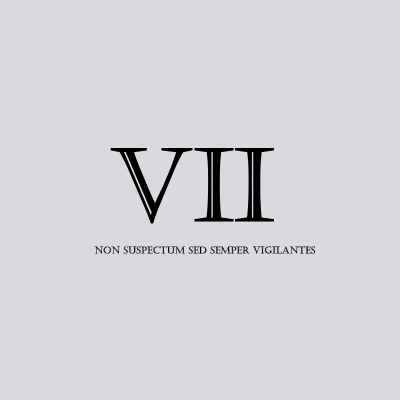 VII Logo
VII Logo
The "Vital Seven", the Vitalis Septem or simply VII are as their names suggests, a Vital part of the V.F.A. Unlike the direct branches, the Vitalis Septem operate as independent units in theory and in practice most of the time, although they all are known to work with direct V.F.A. branches and external intelligence agencies when needed. Unfortunately, VII has in some ways grown out of control by the V.F.A. and their employment, especially inside the nation, has caused many problems. The assassinate of politicians, and officials within the Republic has become quite the problem and has also led to Vitalis Septem agencies to end up being employed by politicians and the rich to protect themselves from other Vitalis Septem organizations. This issue has led to the increased use of internal agencies to counter them, which hasn't been very effective thus far.
Abroad, they operate under contracts given by their contractors and mostly abide by these terms except when they find the terms better to be twisted a little bit for more effective results. It is also not uncommon to find that a particular agency to be associated with operations for a nation in particular. It used to be against the rules for VII agents to work against each other for rival nations, but this rule has been "adjusted" over time to simply mean that one agency cannot double-cross their clients. There is also an unshaken agreement that if suspicion that two different agencies are working against each other, that a falseflagging operation shall be conducted to throw them off their trail. To this date, any such suspicions have been surpressed by the efficient and subtle use of falseflagging, evidence planting and other means.
The agencies themselves often specialize in a certain field, although all are proficient in all fields for that matter. Some are more balanced in their approach while others go all out in a particular area of expertise.
Vulpes Oculus
The Vulpes Oculus, or The Fox Eyes, are experts in intelligence and counterintelligence operations. They also tend to be the least well known of the branches, for this reason, as their ability to blend into a crowd or hide in plain face is legendary. The Vulpes Oculus also refuse outright to take part in violence, but are not so opposed to stealing documents, destroying and planting evidence, providing false scouting reports, and stealing state secrets. They are rivals to the Viglate Canis.
Filii Noctis
The Filii Noctis, or Children of the Night, are an agency that focuses on being skilled in all forms of operations, but they are also masters of none. While they commonly do not take part in violence, and are more inclinded to soft means, this does not mean that they are not skilled in any of these fields whatsoever. They often are known to support political unrest and cult activities to undermine the enemies of their clients. They are active rivals of the Nocte Accipitres and two often find themselves working against each other.
Nigrum Manu
The Nigrum Manu, or the Black Hand, are one of the most feared and respected branches of the VII. Notorious assassins, users of hard power in their operations, they are the among best of the best in their field; their motto being Nulli secundus, or Second to None. Many agents from the Nigrum Manu are trained from birth in their dark arts and despite their fame, little is known about them besides the trademark ink-stained hand that is sent to their victims before their demise. Beyond assassination, the Black Hand are also rather skilled in Sabatoge and Assassination. Something about their name makes the hair on the back of one's head stand up, but their honorability and notable refusal to work for clients inside the Republic has garnered them a lot of respect. (More on them in their own piece)
Aquila Mortis
The Aquila Mortis, or Eagles of Death are another agency famed in their assassination skills and friendly rivals to the Black Hand. They are more well-rounded than the Black Hand, and while they are not as skilled in the field of assassination, their abilities are highly touted in the used of hard power. For agents that seek both intelligence gathering, Sabotage, and Assassination, the Aquila Mortis are an ideal choice for many.
Agentibus Calamitatis
The Agentibus Calamitatis, of Agents of Calamitatis might be the most controversial of the VII. As their name implies, they truly are Agents of Chaos, being experts in assassination, bombing, sabotage, poisoning and political unrest. There is no boundary that this organization isn't willing to cross, and they are known for breaking the very code that they swore to uphold. But in spite of all of this, the Agentibus Calamitatis are some of the top earners within VII, perhaps because of this. They are notable rivals of the Nigrum Manu and Aquila Mortis; and do not get the same respect from them as rivals that the others share with each other.
Vigilate Canis
The Vigilante Canis, or The Watch Dogs are a similar organization to the Vulpes Oculus but are not above using violence to meet their goals. They are a favorite tool of rich senators to spy on their opponents and are a jack of all trades, master of no organization similar to the Filii Noctis. Their unscrupulous nature, like that of the Agentibus Calamitatis have earned them a negative reputation but their income has prevented discipline from being taken against them.
Nocte Accipitres
The Nocte Accipitres, or Night Hawks are an agency that is similar to the Filii Noctis and their hated rivals. However, unlike the Filii Noctis, the Noctre Accipitres operate differently overall. Like their sister agency, the Vulpes Oculus, they operate with a code of honor that has given them a rather positive reputation both at home and abroad. While they do offer assassination and sabatoge opportunities to their clients and are quite skilled in them, they would rather steer clear of such means and often times will end up paying the victims' families or protecting them without pay out of remorse. They are also masters at soft power and counterintelligence; infiltrating cults and dangerous political movements and tearing them apart from the inside.
Culture
Common Traits:
National values: diligence, communalism, respect, honor, love and passion.
Common character traits: Passionate, diligent, calmness, humility, protectiveness, tolerant,trustworthy, Religious, Dutiful, mischievousness
Unlike the craziness that tends to be the V.F.A. and VII, Zetans by nature are a rather peaceful and harmonious culture that share many principles with their counterparts in Lusitanians but also have their own quirks.
The family and religious centric nature of society encourages marriage, monogamy, healthy family relationships and strict morals. Adultery is punishable by death on the level of treason. Premarital intercourse, homosexuality, and other forms of ungodly degeneracy are forbidden and those who engage in such matters regardless of sex are considered criminals.
Zetans as a whole are rather tolerant of foreign cultures, so much as the foreigners are peaceable.Strangers are to be accepted as one's own family, but the betrayal of this trust is one of the worst crimes, from both ways. Those who treat a stranger with disrespect are punished and strangers that abuse the acceptance are traitors to the state.
Unlike Lusitanians, Zetan’s are known to be pranksters and rather mischievous. This comes down to the less uptight view of the world that the Zetans have where some childlike fun is encouraged throughout the culture.
Zetans are also known to be an extremely religious and supersitious people, with an innate earningness for their Goddess expressed through the words “I miss Zeta.” or “Really miss Zeta.” Lack of religion can leave Zetans rather melancholic, and down. “Zetamin” is the word for a Zetan being “medicated” by Zeta’s love through religion.
Another interesting aspect of Zetans is their use of Z in the front of words sometimes. This can be seen through them calling sex, zexo or them referring to their friends as Zecs.
Zetans are very diligent, being rather passionate about their work and putting long hours into it, assuming they have taken their “Zetamin”. This is shown greatly through their arts, sculptures, architecture and fine craftsmanship.
Zetans also tend to be rather absent minded, or clumsy at some points, much like their Goddess. They make silly mistakes a lot, which most of the time are menial but sometimes end in disaster such as the “silly mistake” one architect that shall not be named made on the construction of the new Senate, which resulted in it collapsing on itself when it was almost finished.
Religion
Religion is an important part of the life of every Zetan, and is their “Zetamin”. The average Zetan is recommended to worship every day of the week if possible but this often is not possible which leads to withdraw symptoms mentioned above. Being able to pray and worship in the House of Zeta is one of the most harmonies and zen like experiences within Zetan Society.
Other branches of the ID pantheon and other pantheons entirely are openly accepted in the Republic, with temples to them being free to be constructed by the followers of those religions.
Military
The Military operates under the principles of service to Zeta, the Senate and the people of the nation. Though the nation was founded on military discipline through its conquest of the lands the republic inhabits and the wars against the Kobonesi Tribes to the north, the armed forces have increasingly become less and less central to the state itself with the only real combat in recent years coming from the occasional raid from the Kobonesi to the northwest and anti-piratical activities in the Sea of Hinata. The effects of this have resulted in an antiquated military with poor leadership and training.
Army
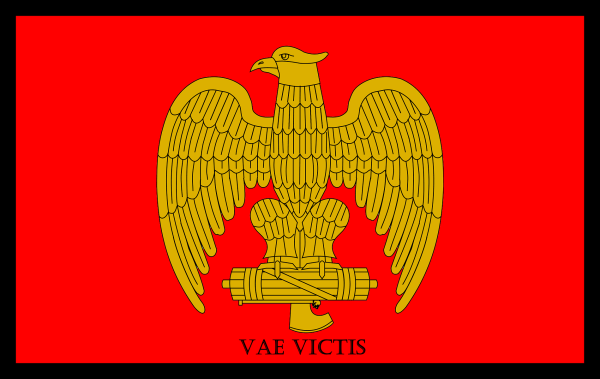 War Flag
War Flag
The Exercitus Zetanus in olden times was one of the most powerful forces in the region. Indeed, it was Zetans that opened the flood gates during the great migration into the Kingdom of Bakatare. During the glory days of the Republic, the Army was modern, well trained, and a well led force that could match or arguably beat any nation in the world in battle. But with the defeats and loss of half of the nation's land in the late 10th and early 11th centuries Bakatare and the ending of the Kobonesi as a true threat thanks to Afonso III of Lusitania, the Army has entered a period of stagnation and decline.
Standing Army
The standing army, known as the Comitatenses, are the only part of the army that are well equipped and trained to meet modern threats. The Comitatenses are armed with modern, finely crafted weapons from Lusitania and are drilled in modern tactics in the use of infantry and cavalry. But there are numerous problems with the standing army.
- Arguably the most important is the leadership. Many of commanders are selected based on nepotism, which gets far worse in higher ranks. Almost none of them are properly trained in the art of war and are merely there because they know somebody, are wealthy enough to purchase command, or are there for political reasons.
- The artillery used is antiquated and old. The unwillingness to adapt to the use of artillery in modern warfare was a key reason in the defeats during the 10th century to Bakatare. While this resulted in the adoption of modern artillery during the time, there was no effort following this to bother updating the arsenal since then. Sakers, Demi-Cannons, Culverins, and Falconets developed during this period are still in use and produced to some degree. Attempts to change this have been refused by the Senate repeatedly and it seems like another disaster would be the only lesson to fix this problem. The worst part is modern cannons are produced or imported, but they are used for the forts and for the navy, not the army. This comes down to the perceived lack of need to do this.
- The standing army is small, being 20,000 men in total. This isn't a problem outright, as shown by Lusitania's system of an Elite Regular army backed up by motivated, trained and well-equipped militia, but when the current standing army is merely adequate on most things, compounded by the poor quality of the "Citizen Army" raises outright concerns about the ability of national integrity in the face of an invasion.
Citizen Army
The Citizen army, otherwise known as Exercitus Civas, in the past was great asset for the state and played a major role during the initial conquest. But centuries of stagnation and defeats have left it as an outdated, poorly trained and poorly led force that is completely unsuitable for national defense. While every male citizen is trained in the use of their weapons and the tactics they would be fighting under, the fact that this is only done once in an adult males' lifetime is telling. Without funding from the state and proper reforms, it will continue to be this force that serves little purpose but that of national pride and questionable defense.
Most of the infantry is armed mostly with Pikes and outdated Arquebuses. This is part of the common theme of the state not funding the construction of arsenals or being willing to spend anything on this army. Some citizens do have flintlocks, and this has become more common as the years go along, but the lack of training in Line of Battle tactics means that this is worthless on a grand level.
The Cavalry might be the only part of the Citizen Army worth a damn. This is because the wealth of those that can afford a horse generally means that the upper classes like the Patricians, Plebians and Equestrians are part of the cavalry. These men are modernly equipped and trained and can be counted with the cavalry in the regular army as reliable and useful.
There is no artillery formally under the Citizen Army, as it was transferred to the Standing Army when the standing army was formed in 1024 VTE. While this doesn't mean that artillery will not join the Citizen army in battle, it does mean that the same problems the regulars have will apply to the citizen army as well.
In the event of war, it is expected that 500,000 men can be mobilized if need be.
Mercenaries
One of the solutions used to the problems of the national army is the use of mercenaries in the case of war. In the most recent war against Bakatare, Mercenaries were crucial in the result of the war being a stalemate. However, the expenses paid to these mercenaries are hardly worth the cost. If Bakatare fully committed to the destruction of the Republic, it is certain that these mercenaries would be of little use in such a situation.
Most of the mercenaries come from Pomerania, and Selenium, traditional and widely used across the region as a whole. As of now, 20,000 Mercenaries are employed.
Doctrine
As with the rest of the army, the Doctrine is also out of date. It relies on the concept of the Standing Army delaying or stopping any invader and the Citizen Army pushing them back and defeating them.
In reality, the nation prays that the Standing Army and Mercenaries stop any hostile threat so that the Citizens never have to be used in battle, given how disastrous it could be if they were committed long term on the nation. The border fortifications on the Bakatare border are a bright spot in this concept, being modern but perhaps not that well equipped. While all of these things work, the many issues that the Republic's army will make these good strategies worthless in a major war against a determined enemy.
Navy
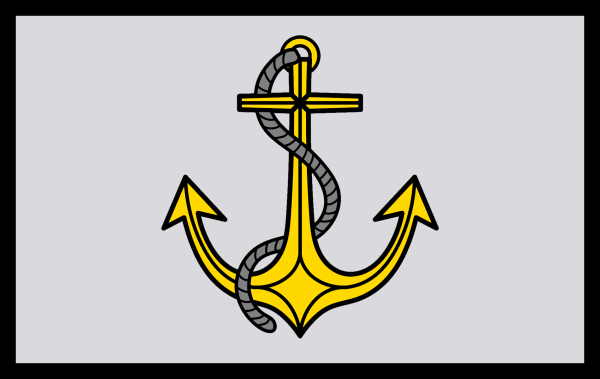 Naval Ensign
Naval Ensign
The Navy or Classis Zetanus, if nothing else, is in a better state than the army. It is sufficient to perform its duties adequately and is modern enough to not be absolutely destroyed by a modern threat.
Doctrine
The Navy's doctrine, unlike the army, is realistic and viable with the resources and equipment is has. Its goals are
- The protection of shipping within the Sea of Hinata from piracy.
- Defense against hostile forces attacking the Republic
- Trade interdiction.
All of these goals are reasonable and are able to be done given the composition. It isn't large and doesn't have to be large.
Composition
The Navy has no capital ships, which would be too expensive for a state that doesn't need them. Rather, the main weapon of the fleet is its Large Frigates, which were inspired by those used by the Agnami Fleet. Along with these larger frigates are smaller frigates, corvettes, and galleys (which are used exclusively for harbor defense.
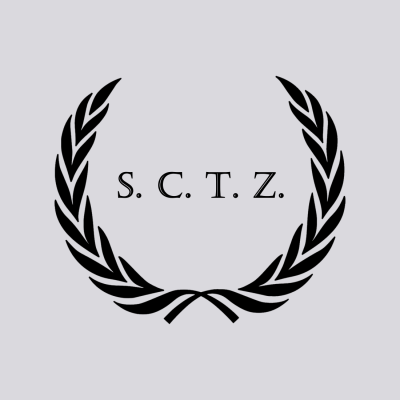 Naval Jack
Naval Jack
Geography
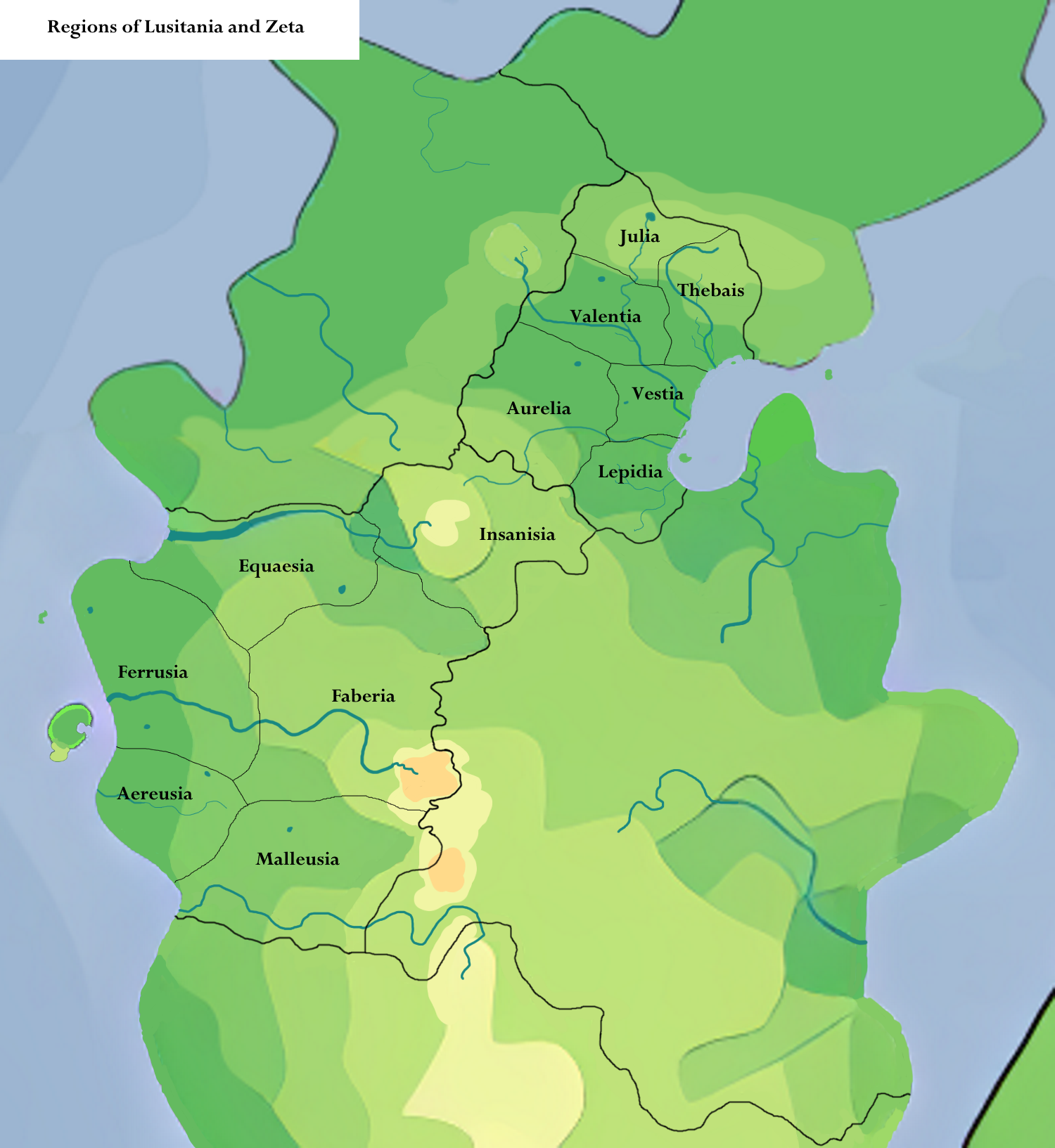
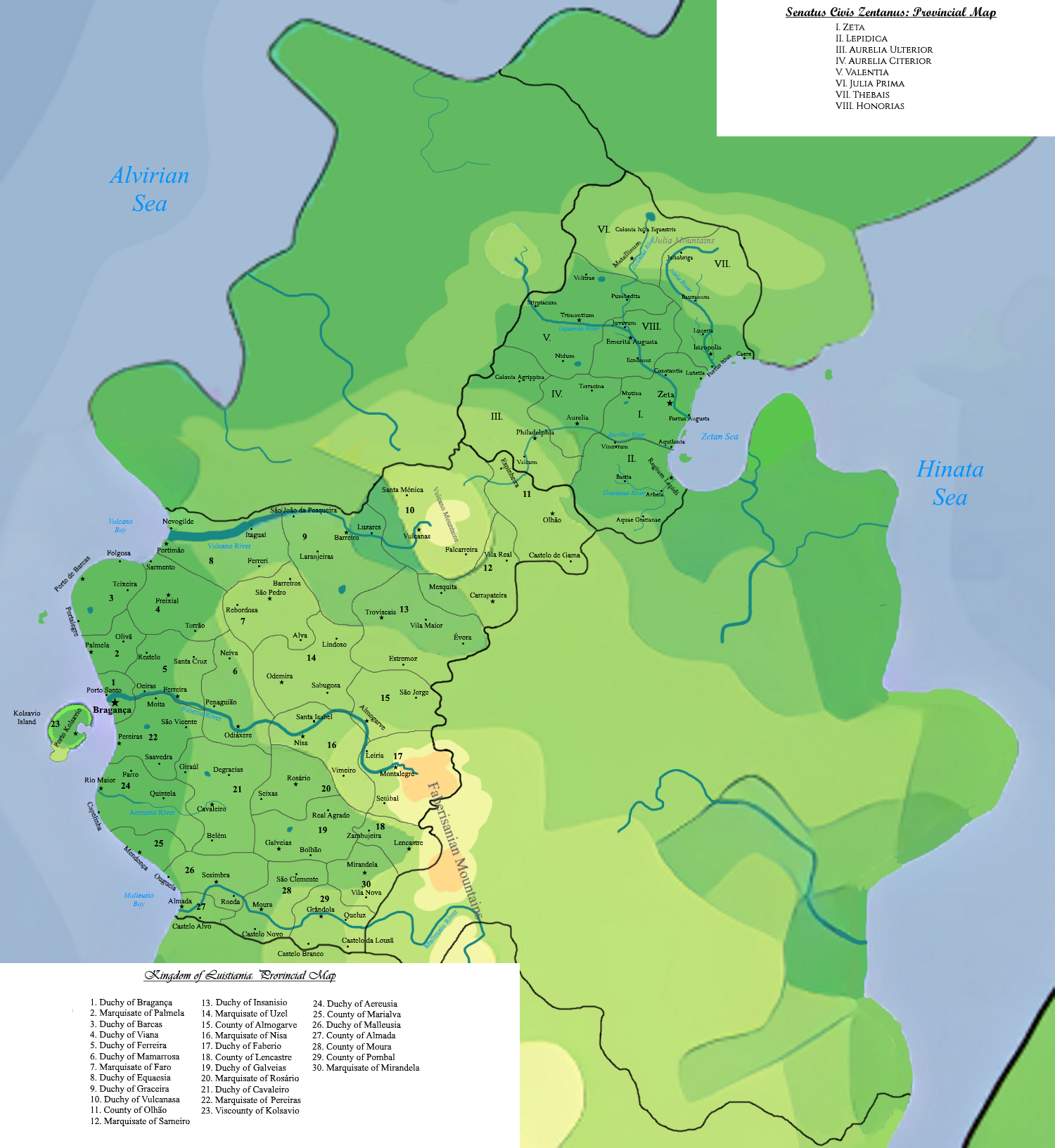
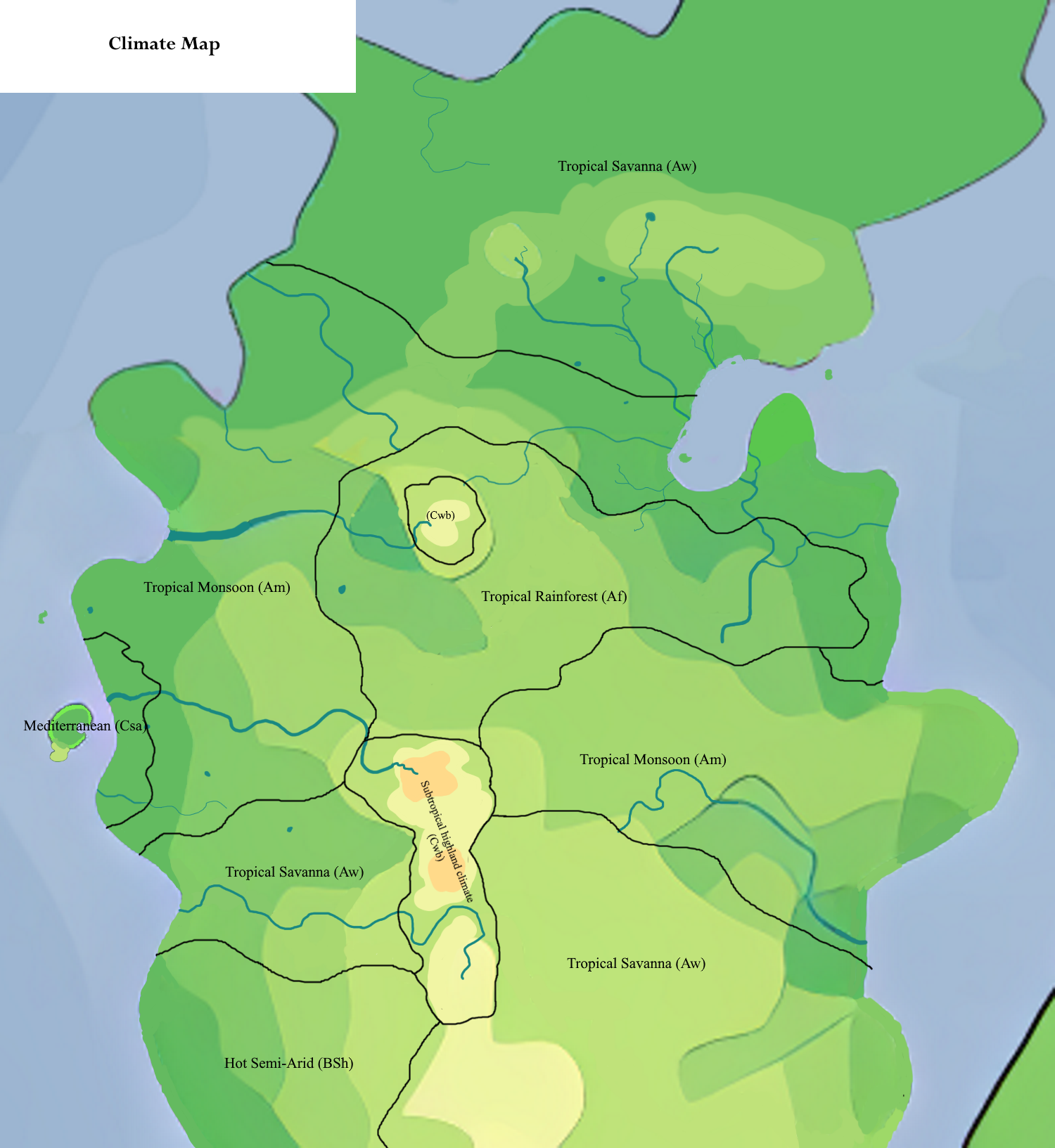
Economy
The Republic's economy, all things considered, is an economy that makes the most wealth not from its good but from its service industry. The bureaucracy and Senatorial gridlock have led to the primary and secondary sectors not being as efficient as they could be, and the dominate patrician landowners constantly interfere with much needed land reform for the growing population of displaced farmers. Inflation is a problem that needs to be addressed as well, and some populists advocate for such proposals as making "Every Man A King" and abandoning the tradition economical system in favor of one more in line with Oiseau and Lusitania. But given the nation's general failure to reform, it is doubtful such things could happen.
Primary
The Primary sector, while not effectively managed, does a fine enough job at producing enough goods to satisfy local demands. Sometimes that is. The droughts that can affect the central and northern parts of the nation have made the stockpiling of grain a state necessity and the constant need for fertilizer has cause many of the citizen farmers that were once the pride of the Republic to lose their lands to the rich.
Agriculture
In the wetter southern provinces of Aurelia, Lepidia and part of Vestia, comes the best agricultural yields for the Republic. The Rice, Maize and Vegetables grown here are the staple crops for most of the Republic. Beyond these, crops are also some cash crops such as sugarcane, coffee and the famous Tea that the republic grows.
In the Tropical Savannahs of the central and northern parts of the nation, wheat is the staple crop but much of the agriculture land is either dedicated to the growth of cotton or to livestock. As noted, these regions run into drought issues and thus much of the food of the south often has to be stored for the feeding of the livestock of this region. Large amounts of Beef, Chicken, Pork and Milk come from these areas. The beef industry in particular is of relative high quality, as a great amount of nation pride is placed in it and the methods used.
Irrigation is necessary for agriculture to truly work in these regions and mass irrigation networks for farms have been built over the years. Another thing of note is the quality of Horses from Valentia, called Valentinians, are highly prized animals that are both fast and strong.
Fishing is extremely important as well, with large fishing settlements lining the coast of the Vestian Bay. Delicacies like Lobster, Oysters, and Clams are common amongst the rich and almost every meal along with the Prized Vestian Wine, local to vineyards near Zeta.
Mining
Most of the minerals mined within the republic come from the northern end of the Vulcano Mountain Range in the south, the Zeta Mountains to the West and the Julia Mountains in the north. Good amounts of Iron, Lead, Bituminous Coal, Copper, and Zinc can be found in both of these regions.
Other materials such as Arsenic, Sulphur, granite and marble are also extracted nationwide and used for many purposes.
Logging
Logging is an industry that is almost a non-factor for the state, being found in the more unsettled areas of the Republic where the wildness hasn't been turned into farms or cattle grazing areas. This wasn't always the case, as great amounts of timbers were harvested in the past, but the natural forest have mostly been taken away, especially in the lowlands. In the hillier regions, you can still find minor logging operations. As a result of this, almost all lumber is imported to the Republic.
Secondary
The Republic's secondary sector is not well developed or industrialized. Most of the production from this sector still comes from artisans and poor management by the central government of the price of imports has caused major issues for these artisans and those interested in establishing larger industrial enterprises. The only industries, aside from those on local levels, that truly profit within the republic's secondary sector are the Glass Industry, the Textile Industry, Leatherworking and Alcoholic Beverage industries. Artisans for any good can be found in the cities and for basic good, in nearly all villages but the cottage textile mills, and tanneries are largely found in Vestia and Valentia. Distilleries are found mostly in big cities, with some local breweries being present in some smaller towns, and wineries being largely around the capital itself. The Glass Industry is mostly found in Thebais.
Metalworking industries are not on a major skill; with many weapons and tools being imported but a good amount of production facilities can be found around where the resources are mined from.
Tertiary
Unlike the two former and unlike many other states, the nation truly makes its money from the service industry. In particular, from the Vitalis Septum and their contracts. As has been stated, the Vitalis Septum has lucrative contracts and many willing purchasers of their services, and this translates to the national economy by the way of how the payments are given to the central government. The caveat with this, as known, is that the VFA, the parent organization, has a great amount of soft power in the nation. There is a bit of irony in knowing that the nation would likely collaspe finacially without the Vitalis Septum.